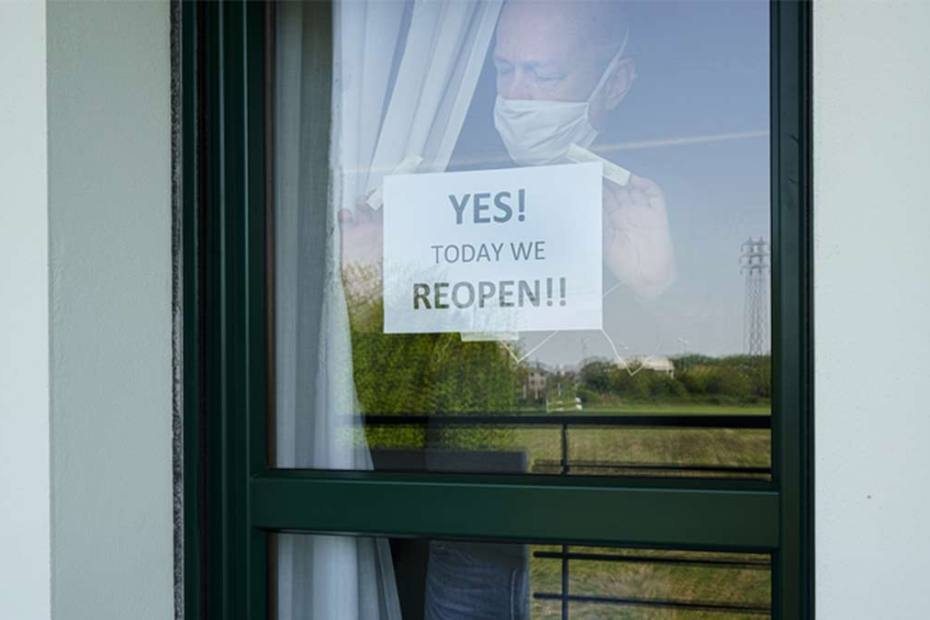Ten Steps for Employers Facing Layoffs, Furloughs, and Workplace Closures
The Coronavirus (COVID-19) has taken a toll on the workforce, with many employers forced to consider furloughs, layoffs, and workplace closures. Few...
5 min read
 Archbright Team Member
:
May 16, 2020 3:44:15 PM
Archbright Team Member
:
May 16, 2020 3:44:15 PM

Although opinions regarding masks and face coverings vary widely, guidance from health experts, including the Centers for Disease Control and Prevention (CDC), states wearing masks or face coverings helps prevent the spread of COVID-19. Many state and local public health officials – including those in Washington, Oregon, and certain counties in Idaho – have mandated the use of masks in public and private workplaces. But, what happens when an employee can’t wear a mask?
Under “normal” circumstances, an employee cannot simply refuse to wear a face covering. Guidance from health officials provides limited exemptions to the face covering requirement. Start with learning the reason(s) why an employee can’t wear a face covering in the workplace. Then, follow the steps to explore potential accommodations.
Government and health officials recognize that certain disabilities make wearing a face covering difficult or impossible. A person with a respiratory condition, for example, may be unable to breathe effectively with a face covering. This raises questions for both businesses and employers regarding balancing current government and public health and safety mandates with the rights that the ADA affords people with disabilities. Even during a pandemic, public health mandates do not replace the ADA; both must be considered. The Northwest ADA Center states that “After exploring ideas for reasonable modifications, there may be rare instances when it is not possible to accommodate an individual. It does not have to provide a requested modification if doing so would create: a) A direct threat to its employees or customers, and/or, b) A fundamental alteration to its business practices.” Based on this guidance, simply not wearing a mask in the workplace may create a direct threat to other employees’ safety, and therefore may not be a reasonable accommodation.
Let’s take a closer look at mask mandates in each Pacific Northwest state, ADA implications, and protected leave options.
Effective June 8, Washington’s Safe Start Reopening Plan requires all employees to wear a cloth facial covering, with the following exceptions:
Employers must provide cloth facial coverings to employees unless their exposure dictates a higher level of protection under the Department of Labor and Industries’ safety and health rules and guidance. Refer to Coronavirus Facial Covering and Mask Requirements for additional details.
The Washington Department of Health Order 20-03.1 dictates face coverings must be worn with limited exceptions, including: “Persons with a medical condition, mental health condition, developmental or cognitive condition, or disability that prevents wearing a face covering.” A series of FAQs from Labor & Industries (L&I) provides guidance for Washington employers. In those FAQs, L&I states that “employees with a medical or disability issue, who are requesting accommodation, must provide their employer with an accommodation statement from their medical professional specifying that a face covering or mask should not be worn due to their present health condition. Employers cannot just allow the employee to work without a mask with no other mitigations or accommodations.”
This guidance from L&I may be interpreted to mean that a reasonable accommodation is NOT simply allowing the employee to forgo wearing a mask in the workplace. Employers have an obligation to explore reasonable accommodation, which may include a leave of absence and/or modifying the employee’s workspace or work schedule to allow them to “work alone,” which then would obviate the need for a mask.
The Oregon Health Authority states that masks, face shields, and face coverings are required for offices and indoor public spaces (i.e., grocery stores, pharmacies, public transit, personal services providers, restaurants and bars, retail stores, etc.). Face coverings are required in outdoor public spaces with physical distancing of at least six feet is not possible.
People with a disability or medical condition may request an accommodation from the business if they cannot wear one. If an employee cannot wear a mask, face shield, or face covering because of a disability, the employer must work with the employee to determine whether a reasonable accommodation can be provided. A face shield that covers the forehead, extends below the chin, and wraps around the sides of the face is acceptable.
Oregon’s mask requirement does not apply to employees and individuals that can guarantee physical distancing. The Bureau of Labor & Industries (BOLI) lists the following examples of reasonable accommodations:
BOLI does not include an example where the individual would simply not be required to wear a mask. Therefore, the guidance suggests that reasonable accommodation is NOT simply allowing the employee to forgo wearing a mask in the workplace. Employers have an obligation to explore reasonable accommodation, which may include a leave of absence.
Idaho does not have a state-wide mandate regarding face coverings. Certain health districts and counties have issued mask requirements. The Idaho Department of Health and Welfare has released guidance regarding face coverings. Idaho’s ONE Idaho Pledge encourages the use of face coverings. Employers have an obligation to explore reasonable accommodation if an employee cannot wear a required face covering.
In addition to the CDC and local and state public health officials’ guidance, accommodations may be required under the ADA and equivalent state and local laws for employees that may have a medical condition that prevents them from wearing a face covering or mask. Employers have an obligation to consider “reasonable accommodation” through what is known as an “interactive discussion” with the employee. Part of this “interactive discussion” may be obtaining information from the employee and the employee’s treating physician to determine if reasonable accommodation can be provided for the employee to perform the essential functions of the job.
Before taking action against an employee, below are a few considerations for employers. This is not an exhaustive list, and employers are encouraged to seek legal counsel before taking action against an employee.
Another consideration is whether a reasonable accommodation is available to allow the employee to safely work without wearing a mask? Examples include:
If a reasonable accommodation cannot be made, employees may be eligible for a leave of absence under federal, state, or local law, including:
If the employee is not eligible for protected leave, while not required to provide leave under the law, employers should consider whether an unpaid leave of absence would be a burden on the company. There is no requirement to pay the employee for the absence unless the employee is working remotely and/or paid time off or other paid leave is available.
Eligible Archbright members are encouraged to contact the HR Hotline with any questions or to seek specific guidance. KeyNotes and sample policies are available to eligible Archbright members in our HR Toolkit or the COVID Resources page. Archbright members can login and visit our COVID-19 Resources page under Member Home. Non-Members, just complete this form to access our COVID-19 Resources.

The Coronavirus (COVID-19) has taken a toll on the workforce, with many employers forced to consider furloughs, layoffs, and workplace closures. Few...

Over the course of the COVID-19 pandemic, many employers allowed their workforce to perform their jobs remotely to mitigate the risk of exposure. Now...

Over the past several days, Washington, Oregon, and Idaho have announced a gradual lifting of ”stay home” orders and reopening of non-essential...